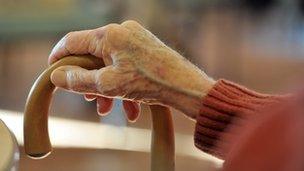Proposed benefit changes could 'exclude disabled'
- Published
- comments

The ability to walk more than 20m is one criteria for the higher mobility rate of PIP
Disabled people would be "ghettoised and excluded from society" under the new benefit rules, says a crossbench peer.
Baroness Tanni Grey-Thompson says the government needs to "think again" about its last-minute changes to the system of Personal Independence Payments.
It replaces the Disability Living Allowance.
Tougher rules to assess how far people can walk mean many claimants will lose help with transport from April.
Those unable to walk more than 20m would qualify, rather than the previous distance of 50m.
Ministers say the benefit will be targeted at those who need it most.
But campaigners say thousands of disabled people could lose out.
New rules
About 3.2 million people receive Disability Living Allowance (DLA), a payment of between £20.55 and £131.50 a week to assist them in leading independent lives.
The Department of Work and Pensions maintains it is making an out-dated benefit much clearer. And that broadly the same number of people will be entitled to extra mobility help.
The government hopes to save £2bn as a result of the switch from DLA to PIPs.
We Are Spartacus, an online campaign group about disabled people's views on the welfare system, analysed figures from the Department for Work and Pensions and Motability, the organisation that supplies lease cars and specialist converted vehicles to disabled people claiming the highest mobility rate of Disability Living Allowance.
With an estimated 428,000 fewer working-age disabled people would qualifying for the higher PIP rate by 2018, report co-author Jane Young said: "This not only condemns thousands more disabled people to the worry of losing out under the new benefit and the isolation this will bring. It also highlights the lie that the government's reforms are targeted to support those in need."
She said that of the 173 consultation responses from organisations on the new PIP "only one suggested the qualifying distance for those who have the most difficulty getting around should be changed."
The Department for Work and Pensions said it had received strong feedback suggesting a need for the 20m measure to bring clarity over the assessment criteria.
A spokeswoman said: "It is not a tightening of the assessment - our modelling shows that, after this change, the number of people receiving the enhanced rate of the mobility component as a result of the 'moving around' activity will be broadly the same.
"The intention of the criteria remains the same - to make sure support is targeted at those who need it most, by making sure those who receive the enhanced rate of the mobility component are those who face the greatest barriers to mobility."
Baroness Grey-Thompson said at her local supermarket she could not get from a blue badge parking space to the doors - 20m is not that far, she said.
The former Paralympian and member of the all-party parliamentary disability group said she had a "real fear" that disabled people would be "ghettoised and excluded from society", under the new rules.
"I'd really like the government to think again. Not just about changing the distance but about actually what the regulations say to ensure that disabled people are really protected," she told BBC Breakfast.
"It could be that over 400,000 disabled people won't get support - and that means they won't get help with transport, maybe getting their children to school or to getting work, and this really radically changes how disabled people are able to integrate into society."
Baroness Grey-Thompson said there would many appeals in response to the move, which would "clog up the system".
"Appeals cost far more than actually just giving disabled people the benefit in the first place," she said.
Fewer qualifying people would mean 160,000 fewer Motability cars on the road, the analysis suggested, which in other research has been linked to economic losses such as fewer jobs in the Motability-related industries, and lower GDP contributions.
Ms Young said: "Disabled people will be less independent, less likely to be able to get or keep a job, more likely to give up self-employment and less able to care for their children or support other family members."
- Published13 December 2012
- Published19 February 2012